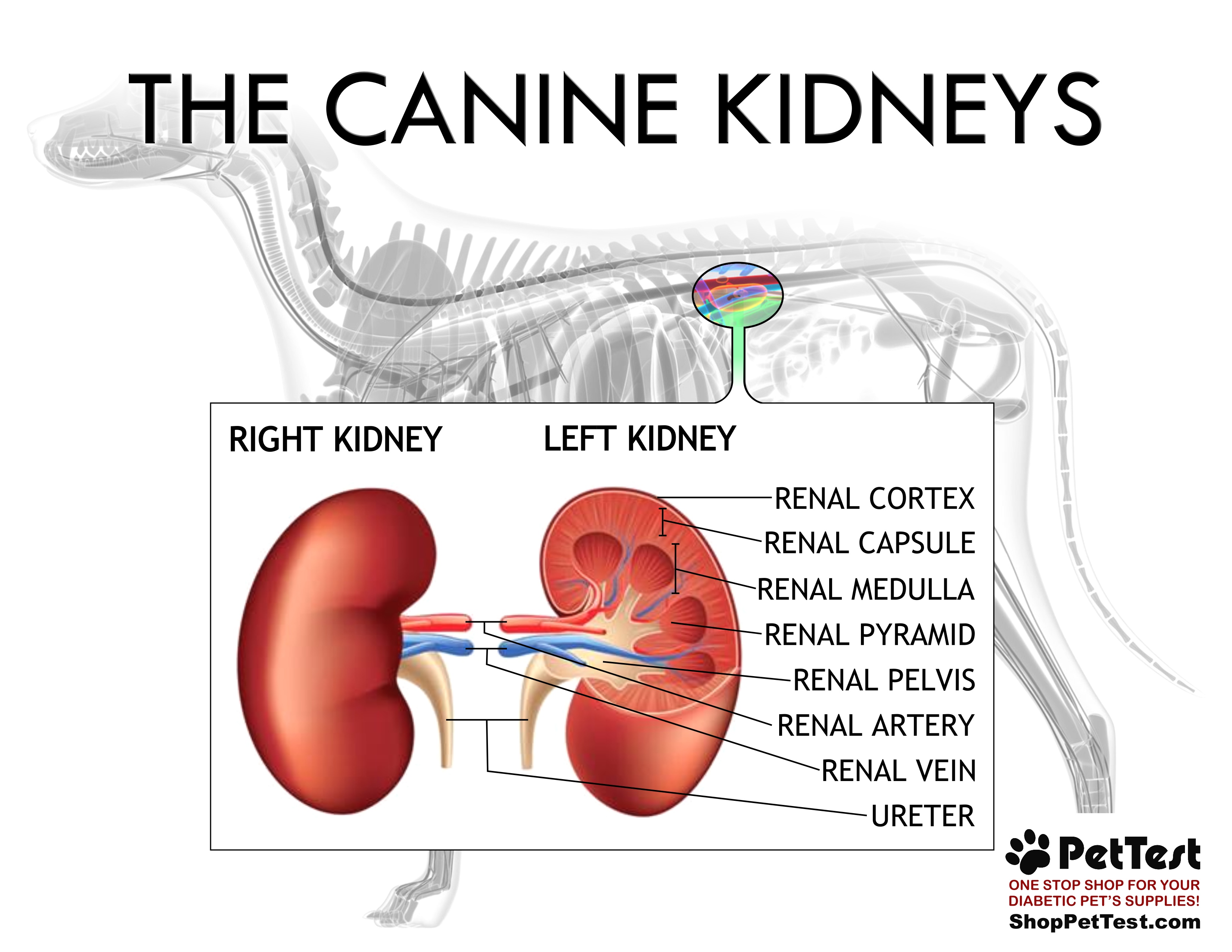Functions of the Canine Kidneys
As you may or may not know we lost our beloved diabetic dog Lucy to kidney failure March 16, 2020 when she was almost 16 years old. When Lucy was diagnosed with diabetes mellitus and acute pancreatitis in August 2015 I did not know just how important it was to manage both DM and pancreatitis because they can lead to kidney disease. Luckily I got her diabetes and pancreatitis under control early on and she did very well for almost five years.
Today I am going to go over the particularly crucial functions of the kidneys, some common diseases/illnesses that can lead to canine kidney disease, symptoms and treatment. So grab a cup of your favorite beverage and let’s get to it.

The kidneys are the primary organ of the urinary system and perform critical functions to keep the body running like a fine-tuned machine. Let’s go over some of the parts of the kidneys and their roles.
Renal cortex – external surface of the kidneys.
Renal capsule- sac of tissue and blood vessels surrounding the kidneys.
Renal medulla – inner part of the kidneys.
Renal pyramid – triangular structure within the renal medulla.
Renal pelvis – collects urine as it is produced.
Renal artery – blood supply to the kidneys.
Renal vein – blood supply from the kidneys.
Ureter – carries urine from the renal pelvis to the bladder.
The kidneys have functional units called nephrons that purify and filter blood. There are approximately one million in each kidney.
What are the functions of the kidneys? A memory aide, or mnemonic used in the medical field is: A WET BED. Let’s break it down!
Control Acid-base balance – the kidneys excrete acids and bases or retain them when the body is lacking them. This ensures the proper pH of dogs’ blood.
Control Water balance – the kidneys regulate the amount of urine they produce to ensure proper hydration.
Maintain Electrolyte balance – kidneys filter out and resupply electrolytes back into the blood as needed. They also excrete excess electrolytes into urine.
Removes Toxins and waste from the body – the kidneys filter out water soluble waste and toxins with urine.
Control Blood pressure – The kidneys produce and store an enzyme called renin. Renin promotes the production of the protein angiotensin 1. Angiotensin 1 is converted in the lungs into angiotensin 2. Angiotensin 2 constricts blood vessels and increases blood pressure.
Produce the hormone Erythropoietin – this hormone helps the body produce more red blood cells.
Activate vitamin D – The liver converts cholecalciferol (vitamin D3) into calcifediol. The kidneys convert calcifediol into calcitriol, the active form of vitamin D. Calcitriol regulates calcium and phosphate in the body.
The kidneys do a lot to keep the body functioning properly. When there is a break-down elsewhere in the body it can cause stress on the kidneys. This stress can lead to kidney disease.
Some causes for canine renal disease are:
- Uncontrolled blood glucose levels in diabetics.
- Infection including pancreatitis, chronic UTI, periodontal disease, bacteria like leptospirosis.
- Toxins
- Cancer
- Kidney stones / kidney blockage
- Genetics – some breeds that are predisposed to different renal diseases are the Beagle, Border Terrier, Doberman, Golden Retriever, Lhasa Apso, Mini Schnauzer, Shih Tzu, Standard Poodle and West Highland White Terrier.
- Geriatric Deterioration – cells in aging kidneys can decline and die. This is the most common cause of renal disease in dogs.
How can we help keep our dogs’ kidneys healthy?
Keeping blood glucose levels at lower levels takes the strain off the kidneys since the renal threshold is approximately 180 mg/dL (10 mmol/L). Once blood glucose levels are over 180 mg/dL (10 mmol/L) the kidneys filter excess glucose from the blood into urine. Higher blood glucose levels = extra work for the kidneys.
Dental health is extremely important in diabetic dogs. Diabetes can cause dry mouth, and since saliva helps keep the bad bacteria in check our diabetics are prone to dental disease. Dental disease can cause uncontrolled blood glucose levels, heart disease and kidney disease.
Hydration is important with diabetics and the kidneys as well. While it is common for a diabetic dog to drink more water, that doesn’t necessarily mean that they are well hydrated. Feeding wet food or a dry food that is soaked in water is healthier for the kidneys. Just a quick FYI: soaking dry food in water can change the digestion rate, so watch blood glucose levels if you do this.
Renal supplements – there are some renal supplements that we can give our aging diabetic dogs to help the kidneys out. I have a couple listed in a previous post that I wrote on supplements for diabetic dogs, to read about them click here.
Monitoring renal function using urine strips – you can monitor renal function using urine test strips. These test strips are easy to use and are a great tool to have in your arsenal. The kidney disease test strips test urine for specific gravity (pH), protein and creatinine. They can offer some valuable information you can relay to your vet when you need to make an appointment. Click here to purchase the One Step VET Kidney Disease Tests that PetTest offers.
I hope today’s blog has helped educate you a bit more on the functions of the kidneys. It is amazing to see just how all these organs work together and it is even more amazing that these organs function the same in dogs AND humans!
Until next week stay comfy and caffeinated!
If you have any questions, comments or suggestions, please start a conversation below.
If you are looking for a Facebook community to join for support, I have proudly been an admin in Diabetic Dog Owners for five years. You can also join Canine Diabetes Support and Information on Facebook as well.
Be sure to join the PetTest family on Facebook and Instagram. PetTest has fun, interactive posts AND they have fabulous giveaways every week!
Do you need a blood glucose meter kit for your diabetes arsenal? Click here to purchase one today!
For a printable version of this blog click here.

